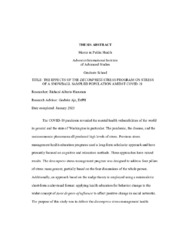The Effects of the decompress stress program on stress of a snowball sampled population amidst Covid-19
Abstract
The COVID-19 pandemic revealed the mental health vulnerabilities of the world in general and the state of Washington in particular. The pandemic, the disease, and the socioeconomic phenomena all produced high levels of stress. Previous stress management health education programs used a long-form scholastic approach and have primarily focused on cognitive and relaxation methods. These approaches have mixed results. The decompress stress management program was designed to address four pillars of stress management, partially based on the four dimensions of the whole person.
Additionally, an approach based on the nudge theory is employed using a minimalisticshort-form audiovisual format: applying health education for behavior change to the wider concept of three degrees of influence to affect positive change in social networks.
The purpose of this study was to deliver the decompress stress management health education program to a population of Pacific Northwest Seventh-day Adventists and their acquaintances (not restricted to a particular location or religious affiliation).
The results of this study indicate that the Decompress stress management education program did not produce any significant decrease in stress levels. However, the feedback of the participants was overwhelmingly positive and demonstrated knowledge reception and recall of key concepts. Those who experienced the greatest reduction in stress levels were those who reported moderate stress levels in the pretest. Future research may focus on being entirely experimental, conducted in a controlled in-person environment and lasting over a longer period while making provisions to account for possible interfering factors and confounding variables.


